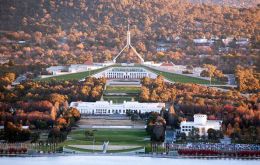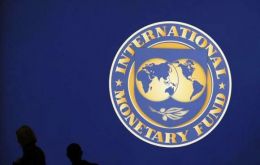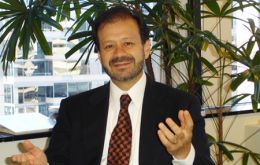MercoPress. South Atlantic News Agency
Stories for October 8th 2014
-
Wednesday, October 8th 2014 - 22:23 UTC
Australia's capital Canberra, the best place in the world to live, says OECD

The Australian Capital Territory of Canberra in Australia is the best place in the world to live, according to a report by the Organization for Economic Cooperation and Development (OECD). Canberra led the regional ranking while Australia topped the overall country rankings, followed by Norway.
-
Wednesday, October 8th 2014 - 21:46 UTC
OAS Observers mission to Peru recommends unifying electoral legislation

The head of the OAS Electoral Observation Mission in Peru, Uruguayan Senator Sergio Abreu underlined the orderly way in which Peruvians went to vote on Sunday's regional and municipal elections, this despite some regrettable episodes of violence in the pre-election phase, Election Day at some polling stations, and at the conclusion of voting in some departments.
-
Wednesday, October 8th 2014 - 20:50 UTC
FAO forecasts shrimp world production could double by 2030

World shrimp production, which currently stands at between 7 and 8 million tons could reach 11 to 18 million tons in 2030, according to projections by the United Nations Food and Agriculture Organization, FAO.
-
Wednesday, October 8th 2014 - 20:40 UTC
IMF forecasts two years of recession for Argentina

The International Monetary Fund anticipates two years of recession for Argentina in a context of “increasing economic misbalances” and “uncertainty” because of the ongoing litigation with the holdouts or 'vulture funds', as well as inflationary tensions.
-
Wednesday, October 8th 2014 - 08:38 UTC
Brazilian pollsters missed percentages but 'confirmed tendencies'

Although pollsters in Brazil got it right with President Dilma Rousseff victory and the growth tendency of runner up Aecio Neves in the last days leading to Sunday's presidential election, they failed dismally in percentage estimates.
-
Wednesday, October 8th 2014 - 08:24 UTC
Uruguay presidential race to be decided in runoff in November seems confirmed by latest poll

A run off in November to elect Uruguay's president seems most certain because none of the two leading candidates will manage a majority in the first round on 26 October, according to the latest public opinion poll.
-
Wednesday, October 8th 2014 - 08:16 UTC
Whoever wins Uruguayan election, no major changes in policy, says US bank

Under the heading of “Emerging markets prospects and strategy” the US bank group JPMorgan-Chase states that no matter who wins in Uruguay's 26 October presidential election, “we do not expect significant changes in the framework of current policy”.
-
Wednesday, October 8th 2014 - 07:54 UTC
IMF keeps Uruguay's growth estimate for this year, but lowers 2015

The International Monetary Fund kept Uruguay's growth estimate for this year at 2.8% but lowered the forecast for 2015 to 2.8% from 3%, according to the latest World Economic Outlook. Last year the Uruguayan economy expanded 4% and the government's target for this year is 3%.
-
Wednesday, October 8th 2014 - 07:51 UTC
Argentina needs an “urgent change of course” and better relations with financial markets

The Argentine economy needs an urgent change of course which would have the effect of reestablishing normal relations with the financial market, a crucial step to open a maneuvering space in an ever more complex environment, suggested Augusto de la Torre, World Bank chief economist for Latin America.
-
Wednesday, October 8th 2014 - 04:05 UTC
World Bank: end of boom doesn’t have to mean a bust for the poor in Latin America

During the recent commodity boom, Latin America and the Caribbean proved that growth could be pro-poor and help fuel tremendous social progress. Now as growth slows regionally and beyond, it is critical to consider what will shore up economic activity while ensuring the poor won't stay behind.
